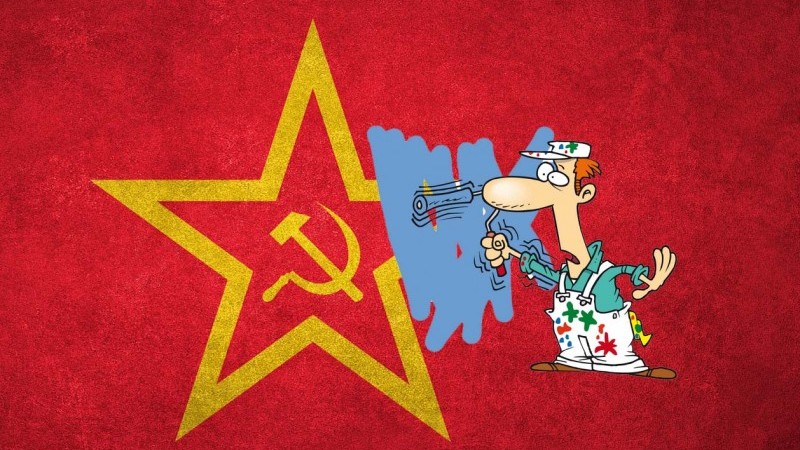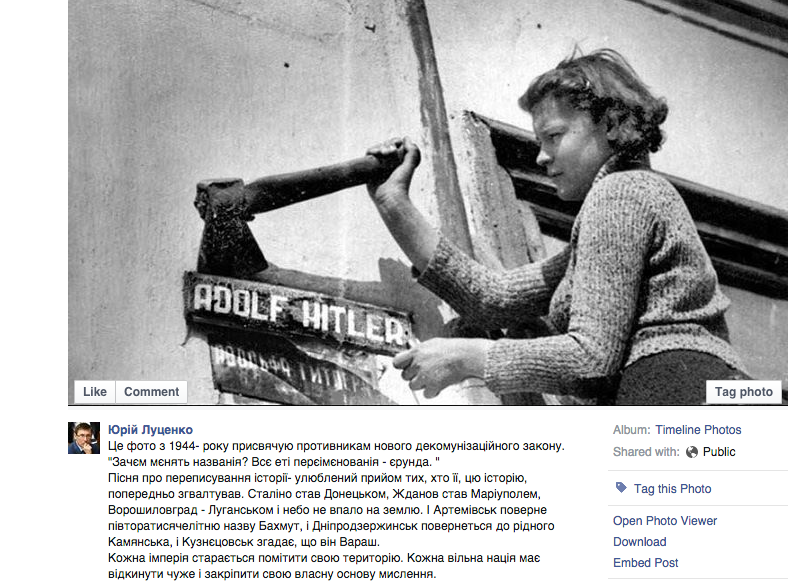
Ukrainian government tries to abandon its Soviet legacy by banning the symbols of the communist regime. Images mixed by Anna Poludenko-Young.
Ukrainian authorities have moved to restrict the propaganda of Communist and Nazi regimes and their symbols in a bid to part with the country's communist past. Some Russian politicians believe this step is a big mistake.
The Ukrainian Parliament passed the legislation with a 56% majority vote on April 9, and the so-called “de-communization” bill [1], already signed by speaker of Parliament Volodymyr Groysman, is now waiting for final approval from President Petro Poroshenko.
What is being banned?
The law bans the propaganda of Nazi and Communist regimes and the use of their symbols in everything from street names and flags to monuments and plaques. More specifically, though, it is only the Soviet Communist regime of 1917-1991 (along with Hitler's Nazi regime) that will fall under the ban. This means the current Communist party of Ukraine, as well as the images and mentions of the founders of the communist ideology, Marx and Engels, will not be banned.
The “de-communization” legislation also declares the Communist government that ruled Ukraine during the Soviet era a criminal regime that “engaged in a policy of state terror.” However, despite some rumors, it doesn’t call for the destruction of monuments to the victims of World War II. The Ukrainian government has pledged to continue to take responsibility for and protect war memorials, military cemeteries, and historical marks that honor the memory of the war. Use of communist symbols is also allowed [2] in history books and research papers.
First reactions
Russian officials have called the law an affront to history and a tool in the “struggle against the heroic past of the people of Ukraine.” [3] At the same time, supporters of the bill insist that it is a part of Western-oriented reforms and that it doesn’t contradict international norms.
Not everyone shares that opinion. The opponents of the new law, a group of almost 50 western scholars, as well as a few Ukrainians and one Russian, published an open letter [4] to President Poroshenko calling on him to veto the bill. They argue that the content and spirit of the law contradict the right to free speech.
Over the past 15 years, Vladimir Putin’s Russia has invested enormous resources in the politicization of history. It would be ruinous if Ukraine went down the same road, however partially or tentatively. Any legal or ‘administrative’ distortion of history is an assault on the most basic purpose of scholarly inquiry: pursuit of truth.
Among other things, the new law also provides for opening the previously secret KGB archives stored in Ukraine. Markian Lubkivsky, an advisor to the Security Service of Ukraine (SBU), said [5] that the SBU is prepared to give almost a million communist regime documents to the Ukrainian Institute of National Memory, a state-sponsored historical research body, for further investigation under the new open access policy.
Служба безпеки України не буде хранителем таємниць комуністичного режиму або будь-якого іншого режиму. Згідно із законом, який був прийнятий, СБУ передасть близько мільйона документів репресивних органів комуністичного режиму […] для того, щоб інститут досліджував, обробив і надав відкритий доступ до цих документів всім, хто бажає ознайомитися з цими документами.
The Security Service of Ukraine won’t be the keeper of the communist regime’s or any other regime’s secrets. According to the new law, the SBU will give approximately one million documents created by the repressive organs of the communist regime […] so the Institute can study, process and make them openly available to everyone who wishes to see these documents.
Ukrainian response
Some members of the Ukrainian online community took the news about the new legislation as a call for action. They started creating Facebook and Vkontakte de-communization watchdog groups [6] for their geographic regions [7]. There they encourage people to share information about the street and town names that relate to former Soviet or communist leaders and thus, according to the new legislation, might have to be changed.
Joining the online de-communization discussion, Yuriy Lutsenko, a Ukrainian politician and former Minister of Internal Affairs, published [8] an old photograph of a woman taking down a street sign reading “Adolf Hitler Street” on Facebook.
 [9]
[9]
This photo was taken in 1944—I dedicate it to all the opponents of the new de-communization law. […] The old “song” about rewriting history is a favorite tool of those who raped this history. Stalino became Donetsk, Zhdanov was renamed to Mariupol, Voroshylovograd to Luhansk. These cities were renamed and it didn’t result in the end of the world. […]
Russian and pro-Russian opinions
Russian state-controlled media and political figures often present the Soviet communist past as a time of economic stability, social wellbeing, and military strength. Not surprisingly, the Kremlin’s reaction to Ukraine’s “de-communization” bill was highly critical.
Sergei Lavrov, Russian Minister of Foreign Affairs, said [10] the law would have a highly negative effect on the peace-keeping negotiations around Eastern Ukraine and suggested that further “glorification of Nazis and deglorification of the real heroes of the Great Patriotic War” risked ruining the Minsk peace deals.
Lavrov was likely referring to the part of the law that provides “public recognition” to anyone who fought for Ukrainian independence in the 20th century, which would include veterans of the Organization of Ukrainian Nationalists [11] (OUN) and the Ukrainian Insurgent Army [12] (UPA). These were partisan armies that at various times fought both Nazi and Soviet exploitation. The bill expands the scope of war veterans being celebrated to everyone who fought the Nazi forces during World War II, which means members of the old Ukrainian Partisan Army are now to be honored alongside Soviet Army veterans.
It didn’t take long for pro-Russian leaders from the separatist-controlled Eastern part of Ukraine to express their criticism of the new law. Alexander Zakharchenko, the head of the unrecognized Donetsk People’s Republic, has called [13] the “de-communization” bill a farce that could set an “irreversible process in motion which could lead to the complete collapse of the country.”
The path forward
One of the amendments in the “de-communization” bill renames the Great Patriotic War (the name used in the Soviet/post-Soviet space for the past 70 years) to the Second World War (as WWII is commonly known in the West). As Ukraine tries to sort out its history as a sovereign state, the new bill is yet another step by the post-Maidan Ukrainian government to part with Soviet legacy which they believe inhibits the country's European future.